June 12, 2025
Always the Smugness
As always, it’s the smugness that gets me in the end. If only I hadn’t valued my superiority as somebody who’d never click on one of those LOCAL STORE CLOSING AFTER SEVENTEEN YEARS EVERYTHING MUST GO ads or buy a sack dress that turned out to be an actual sack. I knew enough not to buy soft pants that looked like hard pants, or tea that tastes like birthday cake. I could tell that the leather was really pleather and that the softest blanket other was anything but. I thought I was savvy, and I even was, a little bit. When the ad caught my eye—a basket for the bbq so that veggies don’t fall through the grill, just in time for Father’s Day—I googled the company in question. Where were they located? They had a street address in Edmonton. And possibly the red flag should have been the text I received from my bank after I made the credit card payment asking if I had actually made this purchase. But of course I had, and so I okayed it, and the transaction went through. SO SO STUPID. What was I thinking? $50 for a wire basket? Yes, it occurs to me now that the price is a little high. And then I got my shipping notification this morning—my $50 wire basket is on its way from ACTUAL WUHAN. But this was a reputable company, right? Um, no, there is another company with a similar name. The company that I’d just sent $50 to for a wire basket has social media accounts that are a month old and have no customer engagement. The address in Edmonton turned out to be for the Chinese dropshipping company will be handling the transport of my no doubt piece-of-crap FIFTY DOLLAR BASKET. I feel very dumb. Meta is a terrible company. And hopefully I’ve learned my lesson and will never do anything quite this idiotic again. [Editor’s note: she totally will do something this idiotic again, but hopefully not this precise thing.)
November 18, 2024
Garbage Bin

Last Tuesday, someone made me really furious, justifiably so, and there is something so delicious about righteous fury, it’s true, and it was the kind of thing that once upon a time I would have posted about on Twitter, receiving such satisfying feedback, my feelings justified, even rewarded with attention and sympathy. LIKE LIKE LIKE. I was even noticing how difficult it was to hold these feelings all by myself, how satisfying it would have been to post them instead (though I was proclaiming them; many thanks to the people I encountered IRL who got to hear all about it) and I was planning on getting around to doing so eventually on one platform or another (maybe this one) but then after some time had passed, I realized that I didn’t actually need to anymore. Screaming my feelings onto the internet did seem like a convenient way to offload them in the moment, but then it turned out that holding them for a little while did the very same trick, and there was insight in that, for me.
(Being angry on the internet actually only ever made me angrier. One day in 2018, in my peak internet rage period, I received an email from a friend informing me that my Facebook account had been hacked, and someone was posting expletives about men having the audacity to whistle in public…but it was actually just me posting an update. And while I still have the exact same feelings about men whistling in public [honestly, it’s shrill and obnoxious. Shut up], I’m no longer losing my shit about it, and we’re all better for this.)
I have had a sense, for a long time, but during the last thirteen months in particular, that a lot of people’s refusal to sit with their uncomfortable feelings has caused our communities a great deal of trouble, created even more conflict in a moment altogether too rife with it. Where the impulse to project one’s feelings in addition to or in lieu of actually feeling them has spilled over from social media feeds to be plastered on lampposts, where people are literally arguing back and forth via graffiti spray painted onto garbage bins, and I’m so tired of all of it, of other people putting their unprocessed feelings (including anxieties) EVERYWHERE, so screaming loud that I can’t even hear my own sensibilities.
And that’s a ME problem, which I’m going to attempt to solve by taking December and January off from my remaining social media platforms (and also by not joining Blue Sky, because there’s only so many voices I need in my head), in addition to avoiding local garbage bins and dealing with my rubbish at home.
November 11, 2024
Where to Start
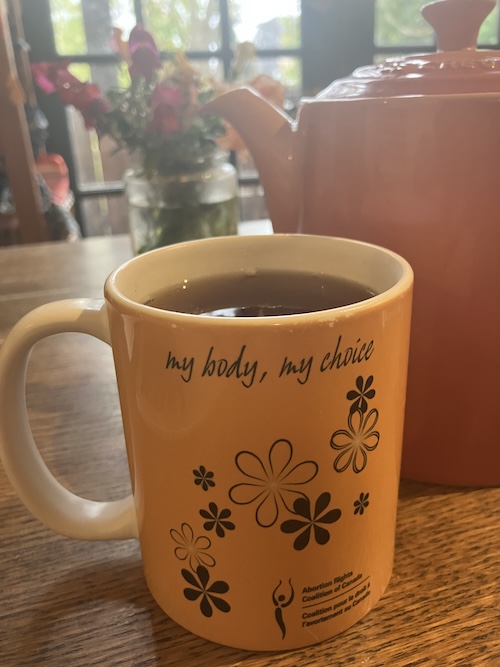
“One implication of all this for politics, I think, is that while it’s important to argue for the world you’d like to see, through activism and advocacy, it’s perhaps even more important to live it. To “start from sanity”, as I’ve termed it, by taking the way you want life to feel – sane, generous, meaningfully productive, embracing of difference, and everything else – and treating it less as something to strive towards, and more as a place to start from.” —Oliver Burkeman
I have some idea of where to start, mainly with a different road that I went down the last time, and I really do wonder what it would have been like for 2016 and onward to unfold in the shape of something other than a Twitter thread. (I used to keep refreshing and refreshing, so sure that if I just kept sifting through the data, I’d finally find the key, the piece of the puzzle that made the world make sense.)
At that point in my life, I resolved to be loud and take up space—as a progressive, as a woman, a a feminist—and I don’t think that resolution was wrong per se, but the way I went about it was. My stance was defiance, the terms of engagement defined by the force I was opposing, and I see now how limiting that was, how unsustainable, and performative, and the inevitability that one day it would break me (and oh, did it ever…).
In my life, I’ve found that fighting monsters turns me into a monster.
I need to define my own terms, otherwise I am already not free.
I keep returning to Courtney Martin’s words (as I so often do), who shared words she spoke with her family on election night: “We are going to move through our lives being as different from him as we can—looking for those who feel scared or left out, welcoming them in, respecting people’s bodies and inherent worthiness, noticing the tenderness in ourselves and embracing it. We have to be as different from him as possible.”
I’ve been quiet on social media for the past week. In some ways, I really do have nothing insightful to add. I have learned through 2+ years in therapy that other people’s feelings are a real trigger for my own anxiety, and that I feel the need to manage these, to process these, and I feel like a lot of my writing online has often been just that, me trying to manage and control other people’s strong emotions, which is the most futile of endeavours.
I am not in charge of other people’s feelings. Other people’s feelings are not in charge of me.
In a few weeks, I am aiming to take a 2 month break from social media, to remove these platforms from my daily habits, mainly because I don’t need all the noise. I still can’t believe the attention I gave to so many ridiculous things back in 2017—since when do I need to know anything about the undersecretary in the cabinet of a head of state in a country in which I do not live? I was being fed perpetual fear and outrage, extremism and polarization.
I will never get back the time I spent reading that, “Time for some game theory…” thread in 2016, and I resent that.
And so instead, I’m going to live my values, instead of screaming them (which, it seems, only makes other people scream back louder).
It’s a place to start, a place from which to move forward one day at a time.
January 2, 2024
Returning to Myself
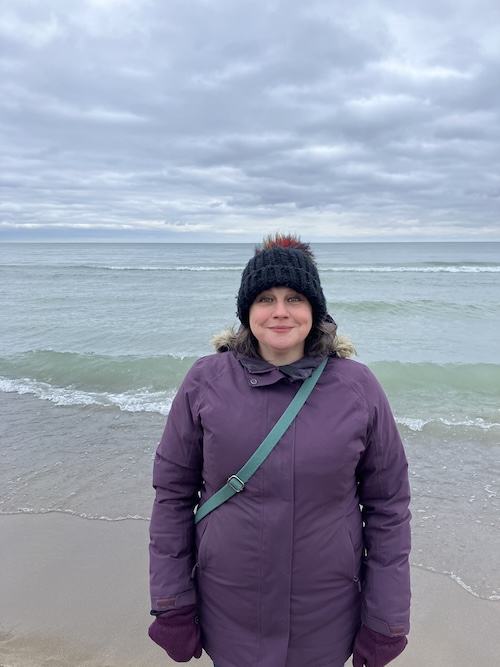
Something I’m grateful for is the way that selfies and Instagram have taught me to make friends with my face, with my appearance, which is no small thing when you’re a woman in your mid-40s (and I kind of wished I’d been able to do as much when I was youthful and 600% gorgeous but had no idea of the latter). For a very long time, I’d see pictures of my self and feel bad about not looking the way I thought I looked in my head. But once selfies became a thing, the face in the photo became familiar, somebody I recognized, even if she looked a little bit odd or the light was unflattering, but who doesn’t look odd, sometimes? How tedious to be the woman who freaks out about appearing in photos with the same face she walks around in the world with all the time.
There was also so much that was gratifying about Instagram’s algorithm’s favouring of faces, and bodies. The whole matter feeling particularly subversive since my face and body defy conventional beauty standards in some ways, and so I’d get to celebrate myself, to feel empowered and good inside my own skin, as though I was the one making the rules instead of catering to somebody else’s standard, and I was, I think, for a while.
Or maybe I never was, I don’t know. What I do know, however, is that at some point it started to feel not good. That whenever I needed the dopamine hit of engagement with my posts, I’d post a photo of my face, and the LIKES would start coming. And is that any way to treat my friend? Something that started off feeling empowering and meaningful becoming a cheap kind of gesture, and I became conscious of that. I became conscious of everything, this performance of my self, my life, my tea cups, even. I did not like it anymore.
Instagram wasn’t a performance, in the beginning. Or if it was, I didn’t notice, because it was serving me, and the LIKES came easily, so I didn’t have to think of them. (There were never so many, but numbers aren’t the kind of data my mind clings to.) I’ve spent the last 23 years putting elements of my life on the internet, and so social media feels natural to me, and I’ve always been able to use it in my own way, creating my own template instead of contorting myself in order to fit into somebody else’s, which is part of the reason why I’ll always be obscure, but it’s also entirely the reason I’m still here.
But last fall, it stopped feeling good to me. Partly it was became I was working so hard to try to sell my book (which is to say, to try to sell myself) and the book wasn’t selling. And—not unrelated—I was stuck in a rut in general, doing all these things both in my actual life and on the internet simply because these were things I always did, and while it’s true that rituals add meaning to existence, it’s possible to ritual so much that the life gets sucked out of them. The small ceremony of #TodaysTeacup began to feel rote. Posting my face began to feel rote. And then, even worse, I was doing all these things by rote and getting less engagement than I’d ever seen before, and it made me feel really bad about myself and about everything, and what even is the point of that?
Last year I struggled a lot to feel present in the moment. I think a lot of it was anticipation about my book release, so much set upon that event that every moment before it just felt like counting down the days. In the summer I swam to the middle of the lake in my favourite place in the whole world, and it just didn’t feel like my head was there, which was terrible since immersion in that lake, in that moment, in any moment, really, is so essential to my mental health. Similar to Instagram, it felt I was performing my experience, doing the things I do because these are the things I do, rather than consciously deliberately doing them.
By mid-December, I was pretty miserable. I actually diagnosed myself with a low grade depression, but I think I was just getting my period. Or maybe I was actually depressed after all, but getting off Instagram did the trick of fixing what was ailing me. Instantaneously. I think I’d been exhausted from the effort of trying to promote my book inside my little sphere of influence, like a crazy maniacal tap-dance that absolutely no one on the planet cared about, and once I got to stop dancing, it felt like such a relief. No longer scrolling past everybody else’s literary end-of-year triumphs, all the while my novel hadn’t garnered a single review. (And yes, I know that there are many writers who’d be grateful for the opportunity/exposure/sales I’ve been lucky to have, which is part of the reason talking about this at all is hard, but…that’s not the point?). Being able to just take a mug down from the cupboard without thinking about it. Heading out with friends and family and not taking a single photo, or if I did, not showing it to anybody. Noticing something beautiful, and not needing to share that beauty in order for it to true. Merely living a day, instead of feeling like I had to document it—and there was nothing mere about it. It was so restorative, and meaningful, and felt like I’d got a part of my life back that was only just for me.
And this is what I’m hoping of more of in this new year, to return to myself, to connect with the moment, to live more offline, and live differently on it. To spend less of my time striving for external validation (so much of which is superficial) and more time doing things that are meaningful to me.
August 11, 2023
On Being Out of My Depth
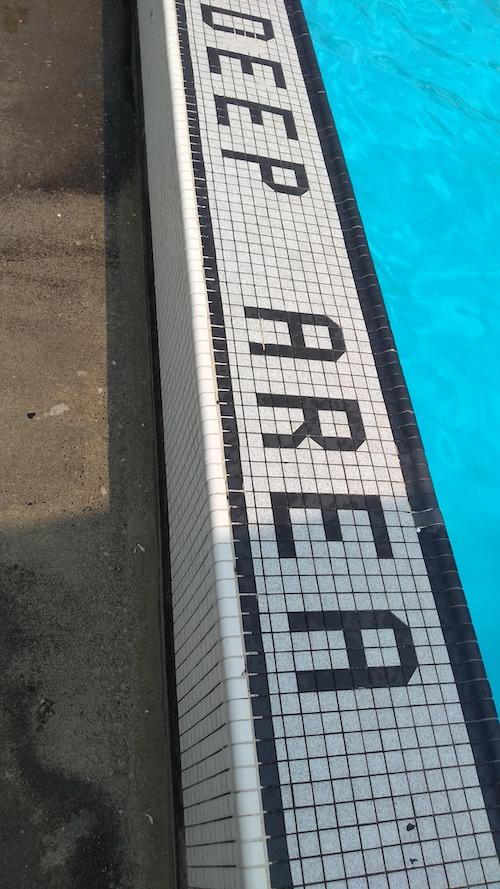
It was story that started it—the kinds of stories we tell ourselves about the importance of being pushed outside our comfort zones, how we can learn and grow from a challenge. I was thinking about my work with writers on their early manuscripts and how scary it can be to open one’s self up for critique, but about how, in avoiding such a thing, we miss the chance to improve and make our work all it can be. I was thinking too about the story I was going to tell at the end of it the night, and how it would be one about triumph, fake it until you make it, about how you just never know what you’re capable of until you try.
I was thinking about how often we tend to underestimate ourselves, and the pitfalls of imposter syndrome, and how essential it is for me to override a tendency to stay small, to stay home. I was nervous, but those nerves, I supposed, were merely a sign that this was important, and that it was time to be brave. Do the hard thing. “Look,” I told my children too smugly. “I’m scared, and that I’m doing it, and *that* is the definition of brave.”
For seven years, I’ve been swimming near-daily, pandemic lockdowns aside, and I’ve come to own an identity as A Swimmer, tearing through Speedo caps, replacing goggles, usually one of the faster people in the pool (now that I no longer swim as the pool where the university swim team trains). And I’ve been curious for a while about trying something a little more difficult, about dipping a toe (ahem) into something with higher stakes, about improving my strokes and having somebody show me how to be better. So I finally signed up for the Masters Swim program at my community centre, drawn in by the suggestion that it would be an introduction to the world of competitive swimming, in which I’d hardly be a foreigner, since I essentially have gills and fins.
Oh, but Reader, it didn’t work out that way. Oh, Reader, I’ve not been so out of my depth (see what I did there!) since the time I decided to sneak a six pack of beer into a Scottish music festival where alcohol was apparently forbidden, and encountered people at the gate pushing in towers of beer cases on dollies. Sometimes, see, nerves are actually our instincts. If underdogs always eventually triumphed, as pop culture might suggest, wouldn’t there be no such things as underdogs after all?
I’d imagined Masters Swim a bit like Old Timer’s Hockey, see, me and a ragtag band of senior citizens. I really thought it would be gentle, an introduction, the name mostly ironic, but it quickly became apparent that it wasn’t. When the coach presented us with our “warm-up” written on a whiteboard, and I couldn’t decipher a single word. And the math! Reader, who would have imagined such math, the requirements delineated in metres, but how was I supposed to know how long the pool was, because I’ve never measured it, and even once I knew, how am I supposed to find space in my brain amidst all the SPORTSING to figure out how many lengths go into 300 metres, just say, and even if I did, how am I supposed to get track of them as I go? Plus we were supposed to be going fast! The whole time! For no discernible reason, because it wasn’t as though any of us were being chased.
I’d really been envisioning somebody holding my hand and showing me how, for once, I might do a proper whip kick. And then when we were waiting for the session to begin and I confessed to feeling like maybe this all wasn’t quite right, the other swimmers—who appeared to be in their early 20s—assuring me that they actually hadn’t swam competitively since high school really didn’t help assuage my fears.
I AM a swimmer. And THIS was the pool where I swim every day, but all the same, I might have signed up for intermediate Mongolian lessons and come up further ahead.
So I bolted. Of course, I bolted. Five minutes after the class started, I was gone, fleeing down Spadina Avenue in my bathing suit, still dripping from the pre-pool shower I’d taken in more hopeful times. Remembering a line from the picture book DOORS IN THE AIR which is one of the essential life lessons I’ve ever encountered in literature: “Remember, you don’t have to stay where you are.” The FREEDOM of that. (The best thing about being 44 is that you rarely have to feel like this ever.)
And so this story has turned out to be a story of abject failure and embarrassment (did they wonder where I’d gone, that weird lady who was only there for five minutes?), instead of triumph. A story that I’m telling because it horrifies me less when I can make it into something, and perhaps it will serve to help you feel better about yourself, because whatever else you got up to this week, at least you didn’t do that. A story about how the universe has a way, always, of keeping me humble. About how sometimes life is just challenging enough, and how comfort zones are fine, and about how I’ll stay in my lane.
June 23, 2023
Happy Birthday, Clarence Thomas?
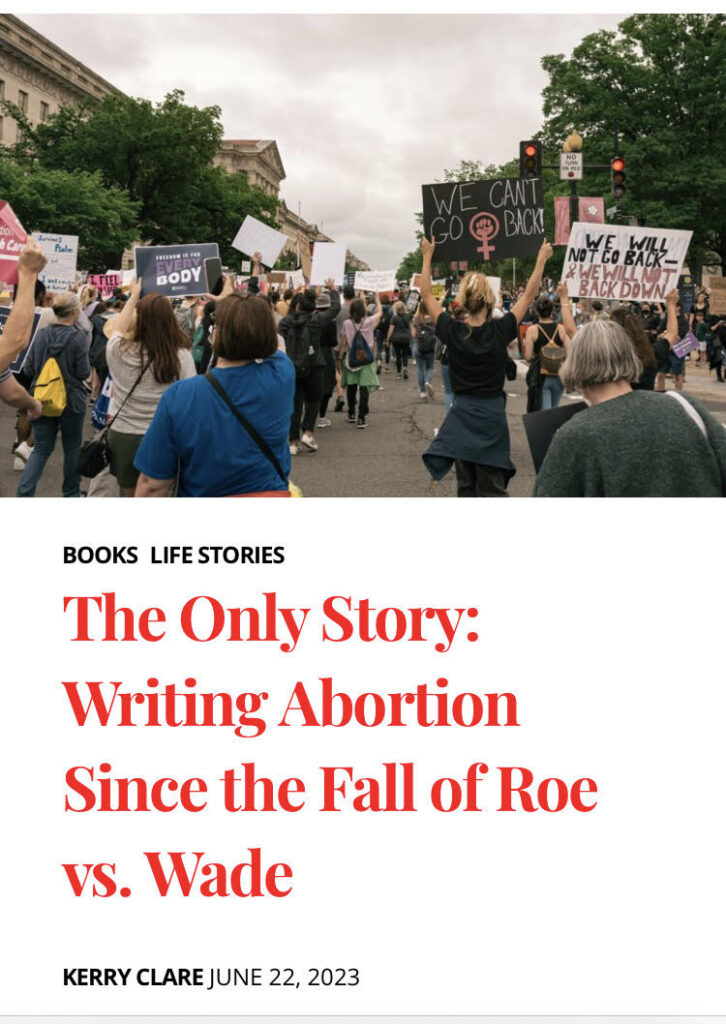
Before last June, it had never occurred to me that Clarence Thomas had a birthday. That he had not, in fact, emerged into the world middle aged, sitting in a room crowded with concerned-seeming people who pronounced “harassment” in surprising ways while telling stories about pubic hairs left on pop cans that were bewildering to my 12-year-old ears, and that I don’t understand any better today.
But it turns out that Clarence Thomas’s birthday is today, June 23, and also the day before mine, which I discovered the morning I turned 43 while hanging out sheets on my clothesline and listening to @mollyjongfast on her political podcast right before I got the terrible news that the US Supreme Court had ended abortion access for millions of Americans.
Happy Birthday, Clarence Thomas…I guess??
Thanks to @shedoesthecity for publishing my essay on the devastation of Roe vs. Wade falling one year ago, but also about how it made me realize how my new novel (ASKING FOR A FRIEND, forthcoming from @doubledayca on September 5) had to end.
May 1, 2023
Harper Valley PTA
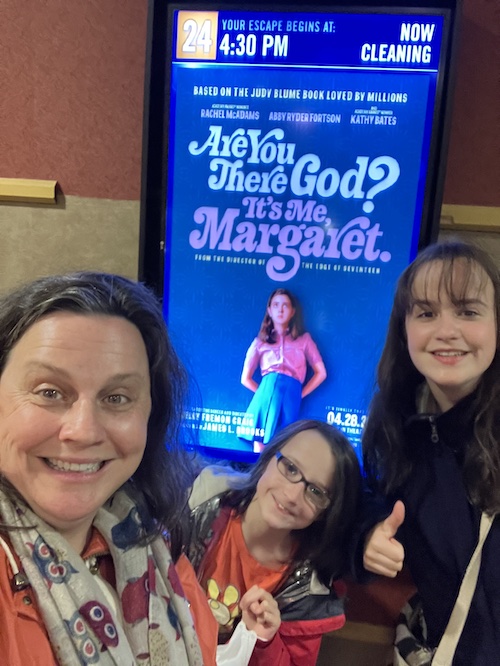
I had but a single reservation about the film version of Are You There God? It’s Me, Margaret, which I saw at the cinema yesterday with my daughters whose companionship for such an occasion was such a treat for me. They’ve both read (or reread) the book in the last few weeks, and were as enthusiastic about the movie as I was. We loved it, and to all be able to experience and love something together is a pleasure I appreciate so very much.
But. But. But.
And this is personal. I’ve spent the last few weeks overwhelmed by several things, not the least of which is a fundraiser for my child’s school that has ended up on my plate mostly because I was the only person who reluctantly failed to refuse it. Because I cannot bear to leave a silence or vacuum unfilled. Because while succeeding in leaving such a silence or vacuum unfilled is an act of liberation (which I’ve even managed to pull off once or twice) it only means that someone else is going to have to do it, and that’s not really liberating at all.
It’s a quandary, and I’ve come full circle, and then some. When my children started elementary school (ten years ago!), I swore off volunteering altogether…because I know myself, how it’s only ever all or nothing, and um, I think I was also still on the board of their playschool at the time. And I was also bowled over by the requests for volunteers and funds (and usually both) at my children’s school. It was too much, it was inequitable, they had galas to raise money for the galas! Okay, that last point is an exaggeration, but I put it in my first novel, Mitzi Bytes, whose protagonist was resolutely anti-school volunteering. She values her time too much to go in for any of that nonsense—and oh, I wish I was her with every fibre of my being. The way she really doesn’t care what anybody thinks or about what she should be doing. She’s not doing it, and it’s simple. What I would give for that kind of clarity.
But of course, I care what people think a lot, too much, and I overthink everything about how to be a good citizen, and a good community member (and how to be “good” in general, which my therapist and I will be continuing to unpack for the foreseeable future), and so when my book was coming out, I eagerly signed up for the school council just so now one would think that the book was autobiographical, and chaired that council for two years, taking on duties to such a ridiculous extent that I was sitting in for the secretary sometimes when I was chairing, taking my own minutes, which is nuts. I also thought a lot about the role of fundraising in public education, registering my discomfort, but by this point understanding how school staff count on these funds, which are raised entirely on the backs of moms whose labour is discounted by assholes like my protagonist and other like-minded folks (who were sometimes me).
I managed to step away from school volunteering eventually, which maybe is the way it should be—we do what we can, take a break, come back again (or not). These days I volunteer twice a month at pizza lunch, which I really like doing, and it’s nicely low key. I’m not on school council anymore, because I did my time. It’s other people’s turn—and that’s a wonderful thing to realize, by the way, when we’re feeling all disgruntled, put-upon, why do I have to do everything? When I stopped showing up, someone else took my place, which is also (sort of) to say that I gave someone else a chance to take my place (as opposed to taking my own minutes; all or nothing, remember?).
But then my elder daughter entered middle school, and it’s very small school, oh no, I saw it coming, really. This spring fundraiser that hadn’t been produced since 2019—who was going to do it. It was going to be me. It was always going to be me, even though I’m not really that good at producing events, and I do so always in the most corner-cutting, simple way possible because I’d rather get it done than do it well. Sigh.
And, truthfully, it’s not been so bad, and I’ve only cried about it once, and if the event manages to be a success (it’s the day after tomorrow), which is to say even approaches reaching our fundraising goal, I’ll be glad I did it. Even though I’ve been bothered that more people in our school community haven’t been pitching in, that such a small number of parents (moms!) are usually the ones who do everything, and so many others are content just to not be involved, to ignore my emails, to not respond to requests for help, content to let it all be somebody else’s burden, which is to say mine.
I think what bothers me so much about the situation is not just that people aren’t helping, but that their failures to help makes me feel embarrassed, ashamed. Sending out these annoying emails week after week, all peppy, and knowing such messages must be so obnoxious to receive, so I feel kind of pathetic, like a loser. And that it seems like I have nothing better to do with my time than this—what does that say about me? About who I am and what I do?
(Like I said, this is personal.)
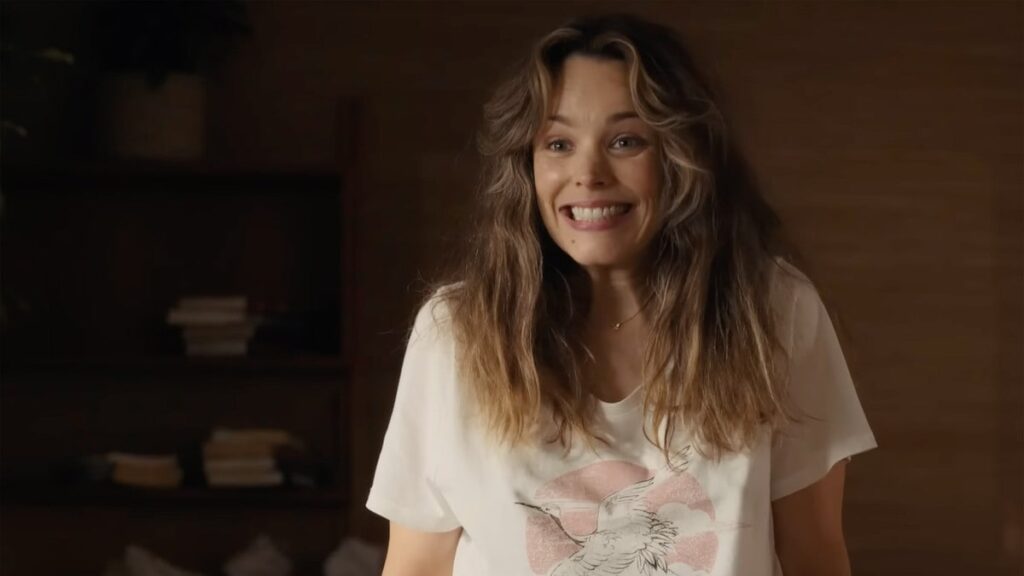
So yes, I was conflicted about the final arc of Rachel McAdams’ character in Are You There…, a bohemian mom who moves to the suburbs and leaps right into the school community because she wants to do the right thing and because for the first time in her life she has the time to, but of course her intelligence and talents are wasted there. The company is terrible, shallow, and the labour itself is totally pointless—she’s charged with cutting out thousands of thousands of felt stars that ultimately end up on the garbage. By the end of the film, she has found better and fulfilling things do with her time, and when she’s called on again to volunteer, she declines, declaring “Because I don’t want to,” and people in the cinema cheered, and I get that, but I also hate that.
In particular during this particular week, as I find myself (metaphorically) cutting out my own felt stars, as I send just one more cheery email urging families to please sign up for the bake sale.
What do we do with this? What do we do with the vital labour of mothers that’s necessity to make up for a public education system that has been hopelessly underfunded for nearly thirty years? What do we do with the fact that it’s often other mothers who are most derisive about this labour? And what do we do that none of this ever has anything to do with the dads at all? (And we can continue—this is about class, of course. About families with the time and resources to commit to school fundraising, which many school communities can’t count on at all.)
These are the circles I’ve been thinking in for almost a decade.
But today I came to some kind of answer, or the beginning of one—at least in my own mind. First, we need schools better funded. We need fathers to be as invested as mothers are in what happens at school, which means less work for everyone. And another part of the answer, which I’ve sort of been onto already, by virtue of being lazy, is my corner cutting approach to things all along. I’m not cutting out any fucking felt stars, is what I mean. This kind of labour is essential, so use it smartly, use it well. Value people’s time. Keep meetings within limits. Respect people’s boundaries. Appreciate people’s talents and skills. Don’t take any of this for granted. And if everyone does a little, that means no one has to do it all.
November 1, 2022
Muffins
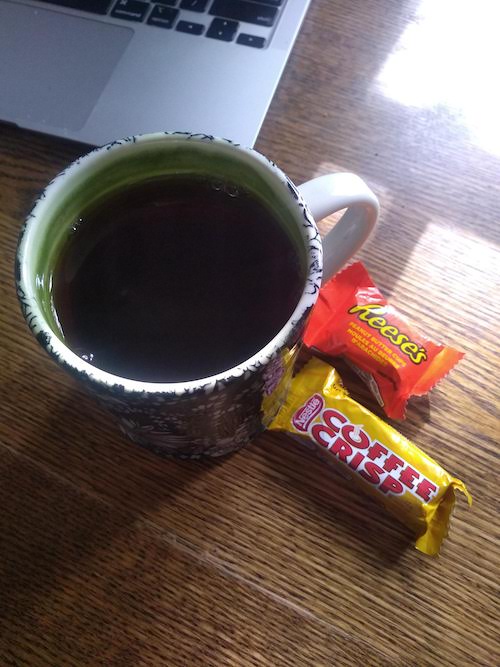
It goes without saying that I support CUPE school staff in their fight for a fair deal.
When the world fell apart in March 2020, the centrality of schools to our communities and families was made more apparent than it had ever been, and of course I stand with the incredible people who care for my children every day and help them learn and grow and have kept them safe in their classrooms during the last two and a half years, which has been no small feat in a global health emergency.
It amazes me that, after all our schools have done for us since 2020 and now that we know how truly essential they are, Ontario voters would once again deliver a majority to a government with so little respect for what teachers and school staff do.
I’m still pretty disgusted that this government is offering families $200 a child to pay for education catch-up after learning loss over the last three years, which is barely going to cover two sessions of tutoring. Because do you know what would actually help to make up those gaps? Investing that money in our school system. Giving education workers the pay they’re asking for (especially since this government has currently bagged a surplus) so our kids can finally have a year without learning disruptions.
Oh, but I’m also super struggling with all this. Part of it is that it’s a reminder of the labour disruptions of 2019/2020 that turned out to be a harbinger of such an “unprecedented” time of upheaval and hardship all over the world. When staff and teachers were taking job action in those days, I went all-in with support, baking muffins for the picketers and marching in the freezing cold, organizing walk-ins and rallies, overestimating the impact of my actions, my ability to make a difference, my obligation in the matter, and also whose political ends I was serving. I’ve got to say that becoming so deeply invested, from 2017-2020, in situations that were actually outside of my control, imagining that the free world and the future of democracy (and public education) was riding on my specific shoulders, completely fucked with my mental health.
Perhaps there are people who can engage in politics without losing their minds, but I might not be one of them.
It’s something on the theme of everything I’ve been talking to my therapist about over the past ten months, which is that there are people who are actually being paid to be at that bargaining table, and I’m not one of them, and so maybe I could chill out a bit? That this (among many things) isn’t my problem to fix, and maybe muffins aren’t the answer?
(Muffins were my way to imagine I had any control at all.)
It’s been a hard three years. My littlest daughter had a field trip to the science centre on Friday that’s been cancelled and I’m more devastated about it than really makes sense, except that for me (whose mental health has been precarious, and whose main triggers are those moments where I can’t make the world alright for my kids) it stands for bigger and harder things than that.
I’m fed up with the political scripts from both sides. I resent the way that both are trying to manipulate my anxiety and emotions for their own purposes. I, like so many of us, feel incredibly fragile after these three very hard years.
It’s just difficult. Of course I support school staff, but I’m so tired.
October 3, 2022
Prismatic Thinking
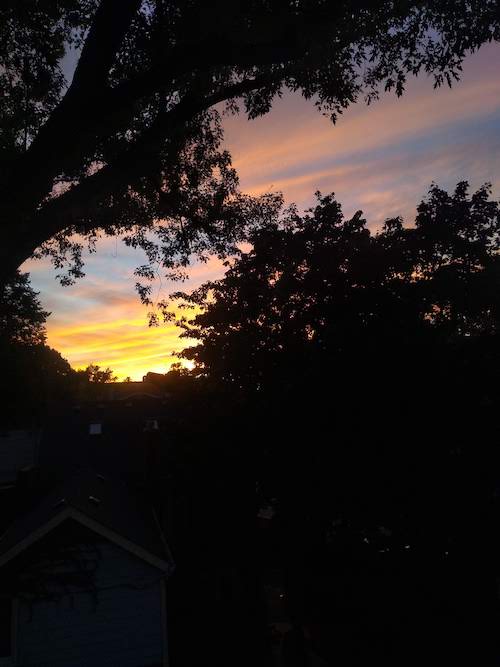
I have a problem with proportion, with understanding proportion. I have a problem understanding just how big the world is and what words mean, and I have anxiety that causes me to leap to extremes, which I think is a more recent development, since everything became so extreme, but I’m not completely sure.
“The town is destroyed,” someone DM’d me last May after a tornado blew through a small town not far from where I live, and I still don’t know what they meant by that, exactly, and I thought about it again while obsessively following the news of hurricanes over the last week and a bit, clicking on headlines with words like “catastrophic” and “devastation”—see my previous point, I have anxiety—and trying to parse the scale.
Everyone I know who lives in places impacted by these storms came through them okay, relatively speaking, some with trees down, one lost a barn roof, another now on Day 9 without power, but still. Everyone I talked to remarked on how lucky they were, which is a human tic I’ve been picking up on since March 2020. Not on social media, where complaints run amok, of course, the common discourse, but in real conversations, these comments immediately followed by empathy for everyone who’d been less fortunate, and it’s patterns like that this make me despair a little less. That make me almost fond of people as a species.
But I still don’t understand what counts as catastrophe, what it means to be devastated, and I think a big part of this is a longing for everything to be okay, for me to find signs of that okayness, to look for the helpers, to quote a cloying phrase. Silver linings. There must be hope, and so there is, and there is, absolutely, because look how much was not destroyed, look at the persistent shoot taking root in a crack in the pavement. There is life, there is promise, but there also comes a point where this becomes denial of reality, a refusal to look upon how high are the stakes of climate change.
All these storms. And there have always been storms. And yet.
But I still don’t know.
I’m bothered by people who flippantly use terms like “the world’s on fire…” Partly because it scares me. I feel like that if the world’s on fire, than it’s not really the time for being glib. And partly because there have always been fires. (I’m doing it again, I know.) But mostly because the world is far too large for it ever to have been one thing, on fire, or otherwise, to be reduced to a single state, and this is what has been racking my brain about these last few months, or possibly forever. How to connect the infinitude all of these dots, this data, especially the parts that don’t connect at all.
I feel like the beginning of possibility for making sense of any of this might lie in the following passage, by Willow Defebaugh, Editor-in-Chief of climate/culture journal Atmos:
“I suppose that’s what it means to see the world through a prismatic lens. It requires us to embrace contradiction and multiplicity, to never be afraid of letting New perspectives read pattern our own. It’s about accepting that life is a kaleidoscope of every human imaginable, in shades of both light and dark, at once disarmingly fragmented and breathtakingly whole. And in those dazzling shards, we find our humanity reflected back at us—jagged, brilliant, and gleaming with possibility.” (Found here.)
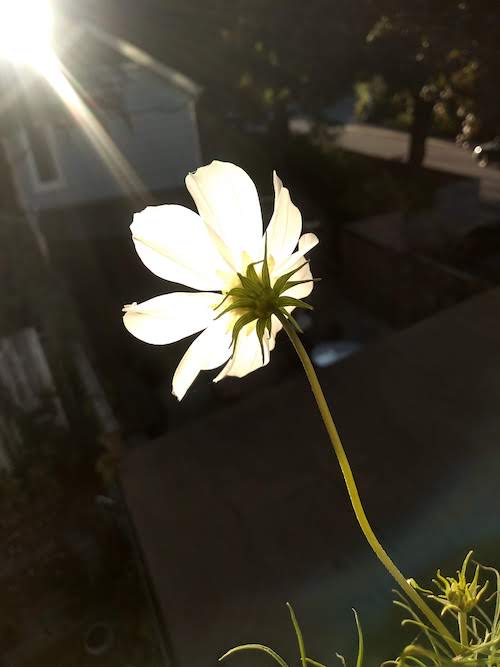
June 24, 2022
Take Back the Story
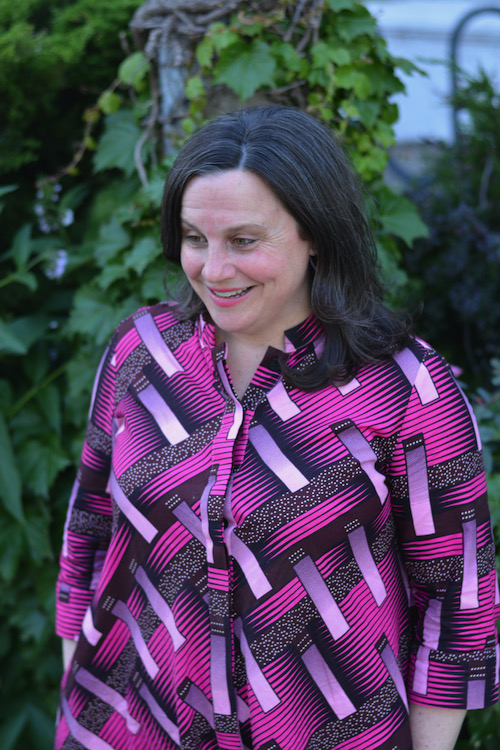
Good morning. Today is my birthday, and the US Supreme Court has overturned Roe Vs. Wade, which makes this birthday even *more* disheartening than the one I spent in 2016 on the day after the Brexit Vote, if such a thing is possible. But perhaps the Supreme Court timed it to coincide with the twentieth anniversary of the birthday when I was pregnant by accident, but didn’t know it yet. The birthday I spent imagining myself on the cusp of incredible new horizons as I’d just graduated from university and was set to venture out into the world with just a giant backpack, but then all those dreams were derailed by faulty birth control, and it was all such a nightmare, so stressful and unbelievably sad, and I don’t remember these emotions at all, but I happened to write them all down in a diary that I was flipping through last night, so there’s evidence. The list of things to do I’d scrawled down around that time included, “Stop crying all the time.” And I eventually did, because I was able to choose my own destiny, to own my own soul, my life. How fortunate was I to be pregnant at a moment some were still describing as “post-feminist,” when it literally never occurred to me that my right and access to an abortion was something that was up for debate. That my reproductive healthcare was anyone’s business except my own.
From my essay, Doubleness Clarifies: It is essential for my purposes that you be able to imagine the desperation of being pregnant when you don’t want to be, of what it is to be staring into that gaping black hole with everything you’ve ever worked and longed for lost inside it.
Here’s what you can do: If you have had an abortion, learn to talk about it so you can speak up and advocate for people like us, even quietly and privately. If your partner had an abortion, speak up and demonstrate that this matters to you. If your ex-partner had an abortion, speak up and demonstrate that this matters to you. Tell your story, and break the stigma that permits abortion stories to remain in the dark, obfuscating the reality that most adult women will have an abortion in their lifetimes. Obfuscating the reality that abortion is normal, and that so many of us have the lives we do because abortion was a gift.
If you’re Canadian, and you have an anti-choice representative in government at the Federal or Provincial level, write them a letter. Campaign for pro-choice candidates in these ridings. Support Abortion Rights organizations in Canada by donating funds. Learn more about why this isn’t just a fringe issue, and why it matters so much—start listening to @aborshpod because it’s wonderful.
If you think this story isn’t about you, your kidding yourself. If you’d like to learn how you might be brave enough to speak out (it took me more than a decade!), DM and I’d be happy to talk.
Don’t be quiet. Don’t be silent. As Ali Smith wrote, “Whoever makes up the story makes up the world.” It’s time for so many of us to take the story back because it belongs to us, and it’s a story that’s proud, and brave, and hard, and real. And I’m so grateful for it.






